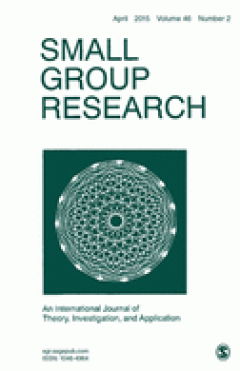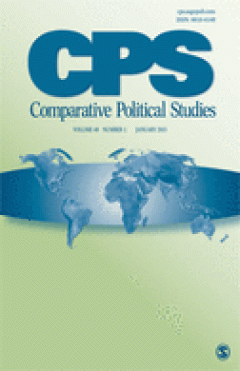Filter by

The augmented newsbeat: spatial structuring in a Twitterized news ecosystem
This article deals with the intertwining of digital and nondigital spaces of news reporting. It focuses specifically on how Twitter affects spatial and temporal orderings of news ecosystems. At the New York state government, actors within the space permeate informational barriers through Twitter while enabling others to follow and engage in events from remote locations. The always-on mentality …
- Edition
- Volume 37, Issue 1 Januari 2015, pages 3-18
- ISBN/ISSN
- 0163-4437
- Collation
- -
- Series Title
- Media Culture & Society
- Call Number
- -

Israeli drama: constructing the Israeli ‘quality’ television series as an…
The current study focuses on the social construction of definitions of quality in the field of the television drama series in Israel. By doing that, this work challenges Pierre Bourdieu�s claim that since artifacts of �popular culture� industries are not regarded as �autonomous�, according to the autonomy-of-art ideology, they cannot be consecrated as works of art. Bourdieu�s thesis was challen…
- Edition
- Volume 37, Issue 1 Januari 2015, pages 19-34
- ISBN/ISSN
- 0163-4437
- Collation
- -
- Series Title
- Media Culture & Society
- Call Number
- -

Entertainment politics: Brazilian celebrities’ transition to politics, rece…
This article proposes to analyse the transition of Brazilian media celebrities into the political sphere during the last three decades by examining five paradigmatic cases of famous figures who have made forays into politics between the years 1982 and 2012. Global changes in the relationship between the media and the political system, as well as contemporary Brazilian history, have been taken i…
- Edition
- Volume 37, Issue 1 Januari 2015, pages 35-49
- ISBN/ISSN
- 0163-4437
- Collation
- -
- Series Title
- Media Culture & Society
- Call Number
- -

Efficacy Assessment of an Intervention Program With Batterers
This study examines the efficacy of an intervention program with male batterers. Twenty-six batterers who attended the intervention and 19 batterers who did not attend the intervention were compared using self-report measures. Batterers who attended the intervention showed significant reductions in abusive behaviors, in attitudes toward domestic violence, in risk of future violence, and in psyc…
- Edition
- Volume 46, Issue 4 Agustus 2015, pages 455-482
- ISBN/ISSN
- 1046-4964
- Collation
- -
- Series Title
- Small Group Research
- Call Number
- -

How Individual Self-Regulation Affects Group Regulation and Performance: A Sh…
This study explored the relationship between individual self-regulated learning (SRL), socially shared regulation of learning (SSRL), and group performance plus the effect of an intervention promoting SSRL. We hypothesized that SRL would influence SSRL and group performance as groups with high SRL students will be better regulated and that the intervention would promote SSRL over time. The resu…
- Edition
- Volume 46, Issue 4 Agustus 2015, pages 431-454
- ISBN/ISSN
- 1046-4964
- Collation
- -
- Series Title
- Small Group Research
- Call Number
- -

The Role of the Star Player in a Cohesive Group
Based on social learning theory, we explore when the most competent member in the group leads to high group performance. We argue that the most competent member in the group increases group performance in high cohesive groups where members interact more frequently and maintain closer relationships with one another. To examine this, we used multisource data collected in two waves from an organiz…
- Edition
- Volume 46, Issue 4 Agustus 2015, pages 415-430
- ISBN/ISSN
- 1046-4964
- Collation
- -
- Series Title
- Small Group Research
- Call Number
- -

Sex Composition Disrupts the Accuracy of Women’s Metaperceptions of Partners
The effects of sex composition of dyads and surrounding others in groups on the accuracy in women�s expected evaluations (metaperceptions) were investigated using the Group Actor-Partner Interdependence Model (GAPIM). The dataset comprised 26 groups of four to six previously unacquainted participants who completed an unstructured social interaction followed by round-robin evaluations and metape…
- Edition
- Volume 46, Issue 4 Agustus 2015, pages 395-414
- ISBN/ISSN
- 0010-4140
- Collation
- -
- Series Title
- Small Group Research
- Call Number
- -

The Trajectory of Emergence of Shared Group-Level Constructs
By examining 20 years of research conducted on groups (and teams), in field, academic, and laboratory settings, we used statistical aggregation indices to evaluate arguments that in newly formed groups, (a) evidence of the emergence of group-level shared constructs should be minimal and (b) evidence of the emergence of such constructs should increase over time/interaction. Puzzlingly, we found …
- Edition
- Volume 46, Issue 3 June 2015 352-390
- ISBN/ISSN
- 1046-4964
- Collation
- -
- Series Title
- Small Group Research
- Call Number
- -

Emotional Intelligence, Information Elaboration, and Performance The Moderat…
This article explores the effects of emotional intelligence (EI) in a team setting. Informational diversity is theorized to moderate the relationship between team EI and performance. I propose that EI increases the ability of team members to engage each other in information elaboration and that elaboration leads to better performance when teams are informationally diverse. In a laboratory study…
- Edition
- Volume 46, Issue 3 June 2015 324-351
- ISBN/ISSN
- 1046-4964
- Collation
- -
- Series Title
- Small Group Research
- Call Number
- -

Dynamic Interplay Between Norms and Experiences of Anger and Gratitude in Groups
Emotions of task group members tend to be congruent, yet the processes that lead to this congruence are not well understood. In this study, we longitudinally followed the convergence of anger and gratitude in 68 task groups, and investigated the role of emotion norms in achieving this convergence. Over time, individual members� emotions influenced the group�s emotions, and, conversely, the grou…
- Edition
- Volume 46, Issue 3 June 2015, pages 300-323
- ISBN/ISSN
- 1046-4964
- Collation
- -
- Series Title
- Small Gruop Research
- Call Number
- -

Rethinking Virtuality and Its Impact on Teams
We propose an extension of the Hollenbeck, Beersma, and Schouten team context model to include a fourth dimension: virtuality�the distance between team members. Based on an analysis of 29 unique approaches to conceptualizing virtuality and a critical comparison of these approaches with the Hollenbeck et al. framework, we recommend that virtuality be measured, along with skill differentiation, a…
- Edition
- Volume 46, Issue 3 June 2015, pages 267-299
- ISBN/ISSN
- 1046-4964
- Collation
- -
- Series Title
- Small Political Research
- Call Number
- -

A Multilevel Examination of the Impact of Team Interpersonal Processes
This study examined factors that affect individuals� intentions to remain with their current organization, as well as team-level, manager-rated effectiveness, using a sample of 78 teams from a large grocery store chain within the Baltic region. The results suggest that team interpersonal processes play a key mediating role in facilitating both outcomes. Specifically, interpersonal processes had…
- Edition
- Volume 46, Issue 2 April 2015, pages 227-262
- ISBN/ISSN
- 1046-4964
- Collation
- -
- Series Title
- Small Group Research
- Call Number
- -

Team Learning in a Multinational Military Staff Exercise
International operations have become one of the main tasks for the Swedish Armed Forces (SAF). The SAF and Swedish National Defence College organize annual international staff exercises with the purpose of training officers to carry out effective staff work. This study analyzed a staff exercise using Edmondson�s team learning model in a military setting. The model was developed by including gro…
- Edition
- Volume 46, Issue 2 April 2015, pages 179-203
- ISBN/ISSN
- 1046-4964
- Collation
- -
- Series Title
- Small Group Research
- Call Number
- -

Cognitive Diversity to Team Outcomes: The Roles of Cohesion and Conflict Mana…
Effects of diversity in team members� rational and intuitive cognitive styles on team outcomes were investigated in a moderated-mediation model, exploring conflict management as a moderator and cohesion as a mediator. The negative effects of diversity on cohesion were moderated by conflict management, such that diversity harmed cohesion when conflict management was low but had no effect when co…
- Edition
- Volume 46, Issue 2 April 2015, pages 204-226
- ISBN/ISSN
- 1046-4964
- Collation
- -
- Series Title
- Small Group Research
- Call Number
- -

Team Performance as a Joint Function of Team Member Satisfaction and Agreeabl…
Recent research on team personality has paid growing attention to team agreeableness; yet the literature is replete with mixed findings regarding the relationship between team agreeableness and team performance. Following the emerging trend of examining the moderating role of team personality traits in team dynamics, we propose a novel view of team agreeableness as a moderator for the relations…
- Edition
- Volume 46, Issue 2 April 2015, pages 160-178
- ISBN/ISSN
- -
- Collation
- -
- Series Title
- Small Group Research
- Call Number
- -

Choice Shifts in Small Groups Engaging in Repeated Intellective Tasks
We examine the propensity of individuals working in small groups to shift choices from their initial positions, following a group discussion, when engaged in multiple intellective tasks. We study the factors that may influence such shifts including perceptions of oneself and others, one�s specialized knowledge level, and the amount of disagreement among the initial choices. Ordered-logit regres…
- Edition
- Volume 46, Issue 2 April 2015, pages 131-159
- ISBN/ISSN
- 1046-4964
- Collation
- -
- Series Title
- Small Group Research
- Call Number
- -

The Domestic Political Conditions for International Economic Expansion: Lesso…
The internationalization of emerging country national oil companies (NOCs) is one of the most surprising manifestations of state capitalism�s resurgence at the end of the 20th century. Existing research argues that structural changes at the international level and economic advantages at the domestic level created a uniform capacity across NOCs to internationalize in the 2000s. Yet, there is sig…
- Edition
- -
- ISBN/ISSN
- 0010-4140
- Collation
- -
- Series Title
- Comparative Political Studies
- Call Number
- -

The Non-Democratic Origins of Income Taxation
This article examines the adoption of income taxes in Western economies since the 19th century. We identify two empirical regularities that challenge predictions of existing models of taxation and redistribution: While countries with low levels of electoral enfranchisement and high levels of landholding inequality adopt the income tax first, countries with more extensive electoral rules lag beh…
- Edition
- Volume 48, Issue 14 December 2015, P. 1974-2009
- ISBN/ISSN
- 0010-4140
- Collation
- -
- Series Title
- Comparative Political Studies
- Call Number
- -

Political Parties, Clientelism, and Bureaucratic Reform
The challenge of public administration reform is well known: Politicians often have little interest in the efficient implementation of government policy. Using new data from 439 World Bank public sector reform loans in 109 countries, we demonstrate that such reforms are significantly less likely to succeed in the presence of non-programmatic political parties. Earlier research uses evidence fro…
- Edition
- Volume 48, Issue 14 December 2015, P. 1942-1973
- ISBN/ISSN
- 0010-4140
- Collation
- -
- Series Title
- Comparative Political Studies
- Call Number
- -

Conceptualizing and Measuring Citizenship and Integration Policy Past Lesson…
Research on immigration and citizenship has become one of the fastest growing areas in political science, with one trend being the boon of comparative citizenship and immigration policy indices. This article discusses methodological concerns with this enterprise. The first half addresses issues with policy indices, including (a) concept validity and boundary maintenance and (b) measurement, com…
- Edition
- Volume 48, Issue 14 December 2015, P. 1905-1941
- ISBN/ISSN
- 0010-4140
- Collation
- -
- Series Title
- Comparative Political Studies
- Call Number
- -
 Computer Science, Information & General Works
Computer Science, Information & General Works  Philosophy & Psychology
Philosophy & Psychology  Religion
Religion  Social Sciences
Social Sciences  Language
Language  Pure Science
Pure Science  Applied Sciences
Applied Sciences  Art & Recreation
Art & Recreation  Literature
Literature  History & Geography
History & Geography